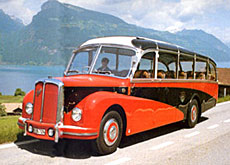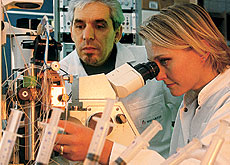Museum honours Swiss kings of the road

For 100 years, trucks built by the Swiss firm, Saurer, have dominated Switzerland's roads, becoming national icons of entrepreneurial and technical achievement.
Although Saurers are no longer being built, an exhibition celebrating the famous trucks has opened in Lucerne.
Exhibition curator, This Oberhänsli, says the company represents a classic story of Swiss industrial success.
“Saurer was one of the first industrial products from Switzerland which made it around the world, which is something that not many Swiss are aware of,” Oberhänsli told swissinfo.
Oberhänsli expects the exhibition, with its unrivalled collection of Saurer trucks, to attract some 200,000 visitors.
“Saurer’s big secret, other than its technical innovation, was that it oriented itself towards the export market from the beginning,” he said.
“In 1907, 85 per cent of Saurer’s annual production ended up on roads around the world.”
Swiss icon
But the company’s true success was always in its home market.
The Saurer brand – known to most Swiss for its military trucks and postal service buses – established its name for reliability in 1903, when the first model rolled out of the Saurer family’s factory near St Gallen.
By 1911, the company was making worldwide headlines when one of its trucks won a race across North America, running for 98 days without breakdown.
The distinctive machines, instantly recognisable for their snout-like front sections and distinctive engine growl, were the first to harness new automotive technology such as mechanical brakes and pneumatic starter motors.
By the end of the 1930s, Saurer began building off-road trucks for the Swiss military.
It was the start of a long relationship, and the army quickly became the company’s biggest and most loyal customer.
The people’s bus
But apart from the technical innovations, the company can also claim credit for helping to “socialise” modern transport in Switzerland.
Until Saurer began making buses for public transport, vehicular traffic was considered the preserve of wealthy Swiss.
Saurers quickly became symbols of individual mobility, allowing people to travel the country in bright yellow buses operated by the post office.
“Saurer was the lasting symbol of a dynasty of transportation,” Christoph Wolleb, a lifelong Saurer fan told swissinfo.
“Anyone that had just the slightest interest in transport and who drove a truck during military service knew of them. There was no way around a Saurer.”
Sleekly shaped and relatively narrow, the trucks were ideal for Switzerland’s tight country roads and tortuous alpine passes.
Fading legend
The last Saurer truck for civilian use was built in 1983. The final military model was built in 1986.
Wolleb says part of the company’s downfall was due to its high production costs, which made the trucks too expensive for the global market.
“Even from the early days Saurer came up with high-tech masterpieces of quality that lasted,” Wolleb said.
“But maybe the quality was too high and in the end, thanks also to management failures, the Saurer truck company came to an end.”
The final chapter in the Saurer story ended in January this year, when the truck-making company closed its last factory.
Although Saurers are becoming an increasingly rare sight on Swiss roads, thousands are still being used in Africa, South America and Asia.
swissinfo, Jacob Greber in Lucerne
Saurer started in 1853 as an iron foundry near St Gallen.
The company began building textile machines in 1863.
The first truck was developed in 1903.
The first off-road truck, designed for army use, was built in 1937.
Saurer trucks were overtaken by Daimler-Benz in 1992, and declared bankrupt in 2002.
The Swiss Museum of Transport is in Lucerne, and is open daily from 10am to 6pm.
The Saurer exhibition runs from May 15 until August 24.

In compliance with the JTI standards
More: SWI swissinfo.ch certified by the Journalism Trust Initiative


You can find an overview of ongoing debates with our journalists here . Please join us!
If you want to start a conversation about a topic raised in this article or want to report factual errors, email us at english@swissinfo.ch.